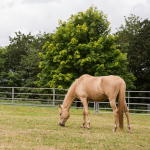There are currently several confirmed cases of Potomac Horse Fever (PHF) in the area. Not commonly seen as a cause of diarrhea in our area, a particularly aggressive strain of the disease has recently resurged as a concerning source of infection in our horse population. PHF is a disease caused by multiple strains of the organism Neorickettsia risticii. The organism lives in a developmental stage of a freshwater fluke, a common worm-like parasite. The fluke infects aquatic snails and aquatic insects, such as dragonflies, damselflies, caddisflies, stoneflies and mayflies. This disease is not transmitted from horse to horse or from horses to people; however, if one horse on a farm becomes infected other horses on the farm are more likely to be exposed. Horses become infected by ingesting infected snails, snail slime, and/or aquatic insects through grazing and drinking. Infected adult flies may travel some distance from the water source where they originated and then contaminate water or feed sources on the farm. Due to the abnormally rainy weather, there may be an increased number of aquatic insects and snails exposing horses to this disease. In our area the peak period for transmission of this disease is July through September. Early detection of disease is key to potential recovery. 
Clinical signs at the onset of illness include:
- High fever ranging from 101° to 107° degrees,
- Decreased appetite,
- Decreased gastrointestinal sounds,
- Loose manure or diarrhea.
If left untreated dehydration, toxemia, colic and laminitis may occur. The fatality rate in untreated cases may reach 30 percent. Up to 40 percent of affected horses develop laminitis.
Although there is no absolute way to prevent exposure to the organism, there are several preventive measures than can be taken to reduce the likelihood and/or severity of disease.
- Vaccination is only between 30-80% effective at preventing infection but may reduce the severity and fatality rate of the disease.
- Reduce exposure to aquatic insects: Clean water buckets and troughs frequently to remove any insects. Keep stable lights off at night to discourage insects from being attracted to the barn.
- Restrict horses from accessing flowing streams and ponds
- Contact your veterinarian immediately if your horse develops a fever, does not want to eat or develops loose manure.
(Information adapted from the July 2013 bulletin issued by the Virginia-Maryland Regional College of Veterinary Medicine and Merial)
